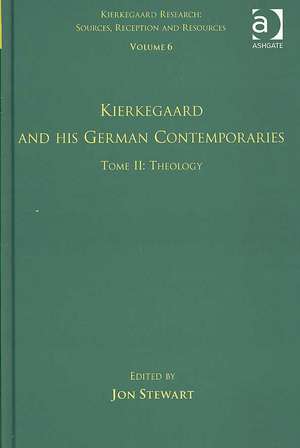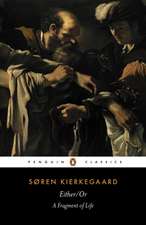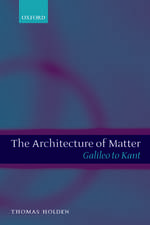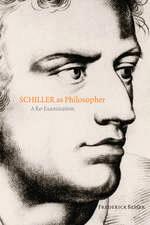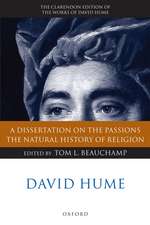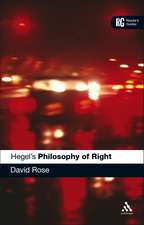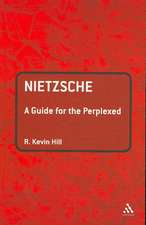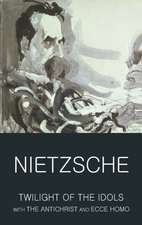Volume 6, Tome II: Kierkegaard and His German Contemporaries - Theology: Kierkegaard Research: Sources, Reception and Resources
Editat de Jon Stewarten Limba Engleză Hardback – 28 aug 2007
| Toate formatele și edițiile | Preț | Express |
|---|---|---|
| Paperback (1) | 338.33 lei 43-57 zile | |
| Taylor & Francis – 27 feb 2017 | 338.33 lei 43-57 zile | |
| Hardback (1) | 821.53 lei 43-57 zile | |
| Taylor & Francis – 28 aug 2007 | 821.53 lei 43-57 zile |
Din seria Kierkegaard Research: Sources, Reception and Resources
-
 Preț: 310.71 lei
Preț: 310.71 lei -
 Preț: 386.77 lei
Preț: 386.77 lei - 18%
 Preț: 1055.21 lei
Preț: 1055.21 lei - 18%
 Preț: 1065.78 lei
Preț: 1065.78 lei - 26%
 Preț: 820.71 lei
Preț: 820.71 lei - 18%
 Preț: 1064.19 lei
Preț: 1064.19 lei - 18%
 Preț: 1060.87 lei
Preț: 1060.87 lei - 25%
 Preț: 826.15 lei
Preț: 826.15 lei - 18%
 Preț: 1071.27 lei
Preț: 1071.27 lei -
 Preț: 469.34 lei
Preț: 469.34 lei - 18%
 Preț: 1056.95 lei
Preț: 1056.95 lei - 15%
 Preț: 703.76 lei
Preț: 703.76 lei - 18%
 Preț: 1117.49 lei
Preț: 1117.49 lei - 18%
 Preț: 1054.71 lei
Preț: 1054.71 lei - 18%
 Preț: 1116.27 lei
Preț: 1116.27 lei -
 Preț: 381.28 lei
Preț: 381.28 lei - 26%
 Preț: 765.59 lei
Preț: 765.59 lei - 25%
 Preț: 825.63 lei
Preț: 825.63 lei - 26%
 Preț: 821.13 lei
Preț: 821.13 lei -
 Preț: 469.34 lei
Preț: 469.34 lei - 18%
 Preț: 1061.81 lei
Preț: 1061.81 lei - 18%
 Preț: 1062.31 lei
Preț: 1062.31 lei - 18%
 Preț: 1061.81 lei
Preț: 1061.81 lei - 18%
 Preț: 1059.45 lei
Preț: 1059.45 lei - 18%
 Preț: 1059.45 lei
Preț: 1059.45 lei - 18%
 Preț: 1057.89 lei
Preț: 1057.89 lei -
 Preț: 489.26 lei
Preț: 489.26 lei - 30%
 Preț: 768.82 lei
Preț: 768.82 lei - 18%
 Preț: 1116.77 lei
Preț: 1116.77 lei - 18%
 Preț: 1112.03 lei
Preț: 1112.03 lei - 18%
 Preț: 1067.35 lei
Preț: 1067.35 lei - 18%
 Preț: 1056.00 lei
Preț: 1056.00 lei - 18%
 Preț: 1058.65 lei
Preț: 1058.65 lei - 31%
 Preț: 767.80 lei
Preț: 767.80 lei - 18%
 Preț: 1064.98 lei
Preț: 1064.98 lei - 25%
 Preț: 769.69 lei
Preț: 769.69 lei - 18%
 Preț: 1061.06 lei
Preț: 1061.06 lei - 26%
 Preț: 820.32 lei
Preț: 820.32 lei - 25%
 Preț: 823.17 lei
Preț: 823.17 lei - 26%
 Preț: 821.94 lei
Preț: 821.94 lei - 18%
 Preț: 1060.25 lei
Preț: 1060.25 lei - 18%
 Preț: 1057.26 lei
Preț: 1057.26 lei - 26%
 Preț: 850.73 lei
Preț: 850.73 lei - 18%
 Preț: 1054.71 lei
Preț: 1054.71 lei - 25%
 Preț: 854.26 lei
Preț: 854.26 lei
Preț: 821.53 lei
Preț vechi: 1141.40 lei
-28% Nou
Puncte Express: 1232
Preț estimativ în valută:
157.20€ • 164.54$ • 130.84£
157.20€ • 164.54$ • 130.84£
Carte tipărită la comandă
Livrare economică 31 martie-14 aprilie
Preluare comenzi: 021 569.72.76
Specificații
ISBN-13: 9780754661320
ISBN-10: 0754661326
Pagini: 278
Dimensiuni: 156 x 234 x 20 mm
Greutate: 0.54 kg
Ediția:New.
Editura: Taylor & Francis
Colecția Routledge
Seria Kierkegaard Research: Sources, Reception and Resources
Locul publicării:Oxford, United Kingdom
ISBN-10: 0754661326
Pagini: 278
Dimensiuni: 156 x 234 x 20 mm
Greutate: 0.54 kg
Ediția:New.
Editura: Taylor & Francis
Colecția Routledge
Seria Kierkegaard Research: Sources, Reception and Resources
Locul publicării:Oxford, United Kingdom
Cuprins
Contents: Bruno Bauer: biblical narrative, freedom and anxiety, David James and Douglas Moggach; F.C. Baur: on the similarity and dissimilarity between Jesus and Socrates, David D. Possen; Bretschneider: the tangled legacy of rational supernaturalism, Lee C. Barrett; Daub: Kierkegaard's paradoxical appropriation of a Hegelian sentry, Jon Stewart; Erdmann: appropriation and criticism, error and understanding, Stephan Bitter; Günther: Kierkegaard's use of an Austrian Catholic theologian, Christoph Kronabel and Jon Stewart; Marheineke: the volatilization of Christian doctrine, Heiko Schulz; Julius Müller: parallels in the doctrines of sin and freedom in Kierkegaard and Müller, Christine Axt-Piscalar; Rosenkranz: traces of Hegelian psychology and theology in Kierkegaard, Heiko Schulz; Schleiermacher: revisiting Kierkegaard's relationship to him, Richard E. Crouter; D.F. Strauss: Kierkegaard and radical demythologization, George Pattison; Index of persons; Subject index.
Notă biografică
Jon Stewart is Associate Research Professor in the Søren Kierkegaard Research Centre, University of Copenhagen, Denmark.
Descriere
This second tome of the present volume is dedicated to Kierkegaard's main theological influences. In theology as well, the German and the Danish traditions had long been closely connected via their common source: Luther. In Kierkegaard's time the main influence on theology was probably German philosophy and specifically Hegelianism. Most of the German theologians were in some way in a critical dialogue with this movement. Another important influence was Schleiermacher, who visited Copenhagen in 1833 and was important for several Golden Age thinkers. From his student days Kierkegaard kept abreast of the German theological literature, from which he drew much inspiration.
